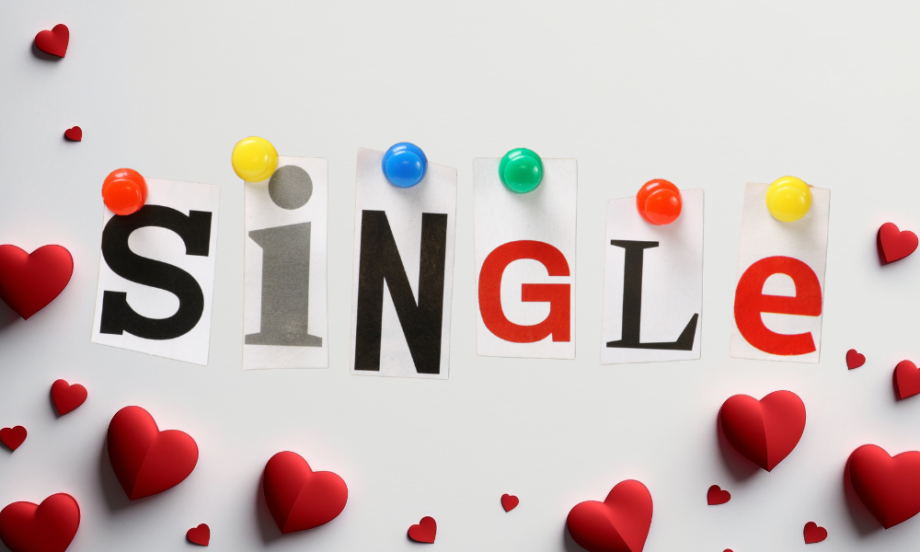Long term relationships
Singleism and the Pursuit of Happiness
The data is in: Single people aren't unhappy. So why does it often feel that way?
Let’s play a word association game. What comes to mind when you think “single?”
If your brain immediately went to ice cream in bed, a pile of tissues, or a solo Friday night, you aren’t alone. “Structural singleism,” or the stereotypes and judgements placed on single people, are more embedded into our societal fabric than perhaps you’ve even realized. However, thanks to recent research from The Journal of Sexual Medicine, we now have evidence that being single doesn’t actually equate to unhappiness. So why does it very often feel that way?
We consulted the research, the psychology, as well as singles themselves to get to the bottom of “the single stigma,” and how to embrace the scientific fact of the matter: Being “single” is not the same as being “sad.”
Read: How to Stop Hating Valentine's Day
The Power of "Singleism"
According to the American Psychological Association, “singleism” is the stereotyping, marginalizing, or stigmatizing of single people, leading to discrimination against them. While it may seem overblown to consider single people “marginalized,” consider the way that laws, systems, or customs might disproportionately benefit couples. Married people are entitled to tax advantages such as IRA benefits. Culturally, we celebrate milestones that feel specific to couples - from engagement, to marriage, to starting a family. The prevalence of singleism makes it easy to feel like if you don’t have a mate, you’re disadvantaged or left behind.
“I often hear the misconception that single people must have something wrong with them if they are not in a relationship, particularly once they reach their 30s,” Natalie Campano, MHC-LP, tells Kinkly. “Single people must be lonely, and hate all things relating to love and relationships. [These stereotypes] can further isolate single people from those in relationships, or insinuate that one needs a partner to find joy.”
But the volume and prominence around “the single stigma” may actually be distracting us from the fact that being single isn’t such a bad thing, at least when it comes to overall fulfillment.
One study by The Journal of Sexual Medicine, published by Komlenac and Hochleitner, asserts that one of heteronormativity’s fundamental assumptions is the belief that all people are attracted to and desire sexual activity with other people in the first place. Komlenac and Hochleitner call this “allonormativity.” The prominence of allonormativity in our culture has created social structures that expect and even privilege sexual and romantic relationships.
“Being interested in or romantically involved with another person is expected. The assumptions or portrayals that single people are less satisfied with life or feel more miserable than do people in relationships are propagated by research that reports that together is better,” the research explains. “Single people are a diverse demographic group with different inter- and intraindividual differences and can have varying levels of life satisfaction. Therefore, being single does not equate with being unhappy. To the contrary, endorsement of the belief that only together is better can be a risk factor for poor mental health.”
Understanding the exact origins of “the single stigma,” as well as how they resonate with your individual experience, is important to finding fulfillment no matter your relationship status. It may come in the form of feeling that you’re being left out of major life moments. It may be associated with certain events that encourage us to couple up, such as a wedding or Valentine’s Day. It may come from the media.
“Pop culture can often ostracize single people by painting them in a negative light or feeding the stereotype of single people not having their life together,” Campano affirms. “I see an agenda being pushed every time a movie or TV show creates a sad, single, lonely character with one goal: To find love. And then we see their lives change afterwards.”
Komlenac and Hochleitner say that we can absorb our allonormative ideas from any number of places. “Expectations are often communicated and reaffirmed in families, among friends and peers and in communities, cultural practices, religious institutions, educational systems, media, healthcare systems, and other social spaces.”
While we’re used to these portrayals that glorify partnership, your personal quality of life goes far beyond whether you have a significant other. Leaning into happiness is possible, and even more likely, when you embrace your singledom and all of its benefits.
The Single Stigma: Unraveling Misconceptions
If you’ve fallen into the trap of believing the many stereotypes that surround singleness, remind yourself that most of those perceptions are untrue, and only feed the false narrative that being single is synonymous with being lonely or sad. Here are a few misconceptions about flying solo that funnel into “the single stigma,” and should be written off if you’re looking to reframe the narrative around singleness.
You’re missing out on something if you aren’t in love
Not everyone experiences romantic love at every stage of life. That doesn’t diminish their ability to live richly and experience life to its fullest.
Romantic love is superior to other forms of love
In an Instagram poll conducted for The Washington Post, 66% of respondents chose friendship over love when asked what was most important to them. Many of these respondents also identified as Gen Z. While the “single stigma” still remains prominent, perhaps this represents a turning of the tides that aligns more closely with contemporary findings on the happiness of single folks.
You want or even need to date
Even if your context or your community feels like it's urging you to date, spoiler alert: You don’t have to do so. You don’t even have to want to. In fact, according to The Pew Research Center, over half of single adults in the U.S. are choosing not to date. You’re not alone in maintaining singleness if that feels right to you.
Read: Thousands of Dating App Users Share Their Hookup Tips
Real People Describe Their “Single Story”
“It’s extremely important to acknowledge and validate the experience of single individuals because they are the true true experts on the topic,” Campano explains. “Hearing from single people gives us a fresh perspective on how they feel about their lifestyle and relationship status. It gives us an opportunity to replace stigmas with more realistic ideas of what it means and feels to be single.”
Here’s what our single readers had to say about their experience unlocking happiness while staying single.
“I think the popular image of the single person heartbroken and depressed in the movies is romanticized. Most of my friends who are like me, ‘forever single’ types, understand their worth and have a set of standards that they aren’t quick to hang up or change their lifestyle for. Ultimately, my decision to remain single until it feels entirely right has saved me from that heartbroken and depressed ‘movie montage’ moment, not the opposite.” - Matt, 35
“The world really is designed for twos. It used to keep me up at night that I want to be a homeowner and that doesn’t feel financially feasible as a single person. But when I think of my life and all of the happinesses I have, they aren’t because I’m single. They wouldn’t go away if I had a partner either. So I’m just leaning in there for now, and not putting pressure on myself.” - Shannon, 29
“There’s definitely a conscious and subconscious push for me to get married, especially since turning 30. But if I haven’t found someone worth spending a life with, why settle? Why rush? I want someone who will enhance the life that I have. I’m really proud of myself for not settling, and waiting for someone who will match the love I know I’ll give them back.” - Kelsey, 31
“I used to dream of finding my soulmate in a significant other, but now I’ve realized that there’s more than one type of soul mate. My soul mates are my best friends. And that’s not to say I won’t one day find another soul mate in a romantic partner. There’s been a lot of beauty in coming to this realization for me.” - Charlie, 31
Overcoming the Singles' Slump
On the days when you just can’t overcome the single slump, try setting boundaries to limit comparison.
“This can help in coping with feelings of judgment,” Camapano says. “While you can’t control the comments someone might make about your relationship status, you can choose to disengage with the conversation.”
Boundaries can be behavioral instead of just verbal. As such, Campano also recommends limiting social media use if you start noticing that seeing engagement posts or honeymoon photos set you off.
Remember: The feeling that you’re supposed to be down in the dumps because you don’t have a partner might be fabricated, or provided for you by allonormative beliefs that urge us to find a mate. Consider whether the things that make you happy on a day-to-day basis are related to your relationship status. Chances are, they aren’t - or at least not all of them!
Read: Self-Aftercare Basics for the Single Kinkster
Breaking the Single Stigma
Contemporary research is clearly showing that singles are a happy group of people. Meanwhile, single people everywhere feel like they have to overcome judgment, marginalization and the feeling that they’re supposed to be partnered or else something is wrong with them. This dichotomy shows that society has a long way to go to mitigate “singleism.”
“We’re seeing the stigma [around remaining single] and the values there slowly change in certain generations, particularly around remaining child free,” Campano observes. “This could be a movement that is followed by reducing the ‘single stigma’ with time. Maybe it already comes up in some ways as we hear more about the ‘cool and fun aunt’ in the media. She’s portrayed in popular culture as childfree and an individual by choice. She lives her best life on her own.”


















